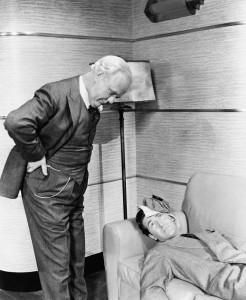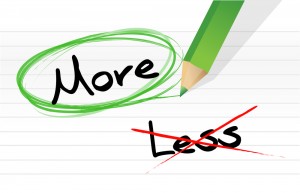
Psychological therapies such as cognitive behaviour therapy, interpersonal psychotherapy, behavioural activation, problem-solving and possibly psychodynamic therapy have been clearly shown to be effective in the treatment of adult depression. However it is not clear, how long such a therapy should last, how many sessions are optimal and what the best intensity of psychotherapy is.
A systematic review found that about 60% of patients had improved after 13 sessions (Hansen et al., 2002) and it is usually assumed that the effect of therapy is greater in the earlier sessions and levels off as the number of sessions increases. However research findings are mixed and most research is based on open uncontrolled studies. These studies do not account for natural recovery rates and consequently only show that patients get better during treatment; which means improvement cannot be attributed to treatment.
A recent study in the Journal of Affective Disorders concluded that the number of sessions per week seems to be most relevant to improvement in therapy, rather than the duration of therapy.
Methods

Does your psychotherapist turn up in a fine tailored suit?
A total of 70 trials were identified that examined the effects of individual psychotherapy and met all other inclusion criteria. A meta-analytic study was used to systematically examine the association between effectiveness of psychotherapies for adult depression and the number of treatment sessions, duration of treatment, total contact time with the therapist and the number of sessions per week.
Inclusion criteria: trials that were randomised and compared the effects of an individual, face-to-face psychological treatment with a control group (waiting list, care as usual, pill placebo, other) in adult patients with depression (either established with a diagnostic interview or as scoring above a cut-off on a self-report depression measure). Individuals with secondary, co-morbid general medical or psychiatric disorders were also included.
Exclusion criteria: studies on group therapies, telephone-administered therapies, guided self-help, computer assisted and internet-based therapies. Studies in which the effect size could not be calculated exactly were also excluded.
Results

More sessions per week, resulted in a considerably larger effect size
The overall mean effect of the treatments was compared to the control groups and to examine the association between the effects and the amount, frequency and intensity of therapy, a series of bivariate metaregression analyses were conducted. This showed:
- A small, but significant association between number of treatment sessions and effect size (slope: 0.010; 95% CI: 0.000-0.020; p < 0.05)
- More hours of contact time between therapist and patient were associated with a greater effect size (slope: 0.013; 95% CI: -0.000-0.027; p < 0.1)
- Longer duration of therapy resulted in a lower effect size (slope: -0.13; 95% CI: -0.024-0.001; p < 0.05)
- More sessions per week, resulted in a considerably larger effect size than fewer sessions per week (slope: 0.45; 95% CI: 0.25-0.64; p < 0.001)
Conclusions
The authors found that:
There was only a small association between number of therapy sessions and effect size, and this association was no longer significant when the analysis was adjusted for other characteristics of the studies. There was no significant association with the total contact time or duration of the therapy. However there was a strong association between number of sessions per week and effect size. An increase from one to two sessions per week increased the effect size while keeping the total number of treatment sessions constant.

Randomised trials are needed to confirm the findings of this meta-analysis
This suggests it might be the intensity rather than the quantity of psychotherapy that determines therapeutic effectiveness. However the results of this study are only observational and should not be considered as conclusive evidence that the number of treatment sessions is not related to outcome. When interpreting the present findings it is important to remember that they are not necessarily indicators of a causal association and it is possible that the association is caused by other factors that have not been accounted for. Although the study suggests longer duration of therapy was associated with less improvement this may be due to frequency of sessions being lower.
There may also be subgroups of patients in which higher numbers of sessions lead to better outcomes. For example in a meta-analysis of psychotherapy for chronic depression there was a clear association between the improvements in patients and the number of treatment sessions (Cuijpers et al., 2010). These findings therefore can only be seen as indirect evidence, and randomised trials are needed to confirm the findings.
Links
Pim Cuijpers, Marcus Huibers, David Daniel Ebert, Sander L. Koole, Gerhard Andersson. Cuijpers, P., et al., How much psychotherapy is needed to treat depression? A metaregression analysis. Journal of Affective Disorders (2013).
Cuijpers, P., van Straten, A., Schuurmans, J., van Oppen, P., Hollon, S.D., Andersson, G., 2010. Psychotherapy for chronic major depression and dysthymia: a meta-analysis. Clinical Psychology Review 30, 51–62.
Hansen, N.B., Lambert, M.J., Forman, E.M., 2002. The psychotherapy dose effect and its implications for treatment delivery services. Clinical Psychology: Research and Practice 9, 329–345.


@Mental_Elf is this true?i seldom go to psychotherapy for my schizophrenia,but I take my medication
More frequent psychotherapy may lead to better depression outcomes, says new meta-analysis: Psychological ther… http://t.co/e5685z3XnX
Yep, provided it is genuine psychotherapy and not CBT rebranded as psychotherapy … because that is just not psychotherapy! But then where do we get it? Few NHS trusts offer it as it is time consuming (therefore not the flavour of the moment). Private psychotherapy is out of reach of the pocket of most, and few charities are able to offer one-to-one.
More frequent psychotherapy may lead to better depression outcomes, says new meta-analysis – The… http://t.co/zIX5RGRAr7
CBT cost branding therapy, I have found pretty patronising
The main problem with CBT is how it is delivered, and not necessarily the therapy itself.
I have found, personally, most people or the CBT therapists to be rather patronising, and over concerned with dumbing down the processes of the brain and the reactions to trauma, it’s a snap out of it and get on with it and here is abc to get you on your way. I guess it’s applicable if you are therapy naive and just need a nudge but its used in most corners of the therapeutic filed as one size fits all, along with the 12 steps.
RT @Mental_Elf: More intensive psychotherapy sessions may be more effective than less intensive regimens: http://t.co/ZrxDBchOub
My latest piece for the mental elf “@Mental_Elf: More frequent psychotherapy may lead to better depression outcomes http://t.co/6OnjNxprfu”
However, it’s important to remember that other factors may be at work: http://t.co/ZrxDBchOub
@Mental_Elf pedant: is “possibly psychodynamic therapy” a new kind of therapy? ;-)
More frequent psychotherapy may lead to better depression outcomes, says new meta-analysis http://t.co/1nOU19h1do via @Mental_Elf
Study says it’s the intensity rather than the quantity of #psychotherapy that determines therapeutic effectiveness http://t.co/pMzCAUdZM7
More frequent psychotherapy may lead to better depression outcomes, says new meta-analysis – The Mental Elf http://t.co/CqJQjzHHUF
More frequent psychotherapy may lead to better depression outcomes, says new meta-analysis – The Men http://t.co/iuFCeNcgte
Excellent review. Whenever I see that intensity can help more than quantity, I am reminded why I am a directive therapist.
Thanks for the great post!!
[…] More frequent psychotherapy may lead to better depression outcomes, says new meta-analysis […]
Excellent report, and a fascinating finding. I’m not in the least surprised. Our treatment model definitely needs some tweaking, but it needs to be guided by carefully done research. This is a start.
The basic notion is sound. Any musician, or school teacher, knows that frequency, “distributed” practice works much better than all-at-once (“mass”) or less-frequent practice. And make no mistake, psychotherapy is definitely a learning scenario, involving practice of concept-reference, reframing practice, and affect-tolerance and transformation experiences. The more often, the better, in my experience.